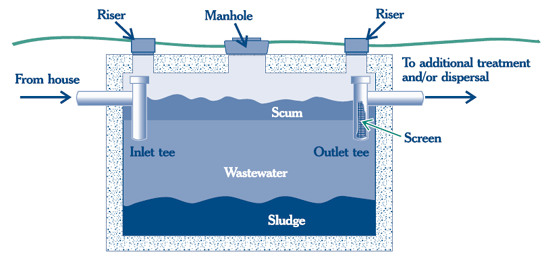Is Septic Safe Toilet Paper Needed for Proper Maintenance of Your Septic System?
Do you find yourself shopping for septic safe toilet paper thinking it will help lengthen the life of your septic system, only to ask yourself “is septic safe toilet paper really necessary?” In this post we’ll shed some light on what types of toilet paper are safe to use with your septic system. We’ll also answer if some brands may be charging more for a product they market as “septic-safe,” when it breaks down the same.
SEPTIC SAFE TOILET PAPER: NOT NECESSARY
What is it with septic safe toilet paper? What id you use regular toilet paper and you have a septic system? Are you damaging your system?
Is Regular Toilet Paper Destroying Your Septic Tank?

Where Does the Toilet Paper Go In Your Septic Tank?
This simple illustration in an EPA publication about how a septic tank works explains how the septic tank naturally separates into three layers. The top layer in your septic tank is the floating scum layer, and is made up of soaps, hair, greases, toilet paper, and other floating waste. In the middle is a liquid layer, known as the effluent layer, made up of wastewater, other liquids, and suspended solids. It’s in this layer that bacteria break down the organic materials before it makes it out to the drainfield. The bottom layer is the sludge layer, consisting of heavy organic and inorganic materials that settle to the bottom of the tank. Sludge is what gets pumped out when we clean your septic tank.
THINGS THAT SHOULD NEVER GO IN YOUR SEPTIC TANK
REDUCE EMERGENCY SEPTIC SERVICES WITH MAINTENANCE
You can do your part to keep your septic tank healthy and reduce the frequency of septic tank pumping. First, don’t put anything down your septic system that is non-biodegradable, such as cigarette butts, diapers, paper towels, and more. Plus, installing an effluent filter, which helps to decrease the number of solids that leave the tank helps promote your septic tank’s health.
24/7 EMERGENCY SEPTIC SERVICES NEAR YOU
We service the Northern Ohio area including Erie, Lorain, Medina, Portage, Stark, Summit and Wayne counties. Our family-owned septic company is the one to call for all of your emergency septic tank services, including septic tank pumping. We can work around your schedule when it’s convenient for you, including working on weekends and evenings. Septic services include installations, repairs, inspections, cleaning and maintenance plans. Rest assured, when you partner with our local, family-owned septic company, your Northern Ohio home or business will be well served. Call to get started today!
